2017牛津译林版七年级下册Unit2NeighboursReadingII
七年级英语下册unit2NeighboursReadingII课件(新版)牛津版
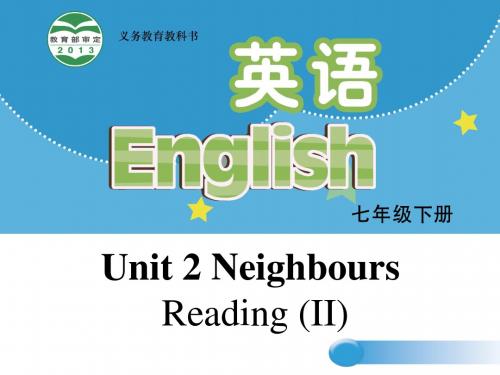
Revision
4. 5.What What’s isSimon’s he going problem? to centre do? What do they share with each Simon’s neighbours 2.3. 1. What Where does do his the community volunteers oftenother? meet? have? meet at the community centre
Simon’s neighbours
The volunteer is
________________________________. fixing the girl’s bicycle
The college student is
helping the boy with his homework __________________________________.
a “helping hands” meeting
share their different skills help us with all kinds of problems There is something wrong with his computer. ask a computer engineer to check it
A doctor can help me to keep healthy.
A Chinese teacher can ....
...
Mrs Wang
There’s something wrong with
Mrs Wang’s fridge.
牛津译林版七年级英语下册unit2 Reading2课件

help sb (to) do sth 帮某人做某事
water flowers
cross the road
The girl can help her mother The boy can help the man
water flowers.
cross the road.
Teacher Sissi’s neighbour
He is Winter. He is a doctor. He always asks us to exercise more. He asks us not to smoke too much.
Language points:
H2.eHaeskalswuasynsoatstkos sums otokeextoeorcmiseucmho. re.
Oh, there’s something wrong with the window.
/something is wrong
Teacher Sissi’s neighbour
S1: Do yo always like to … with her? Teacher Sissi: …
We always like to do some shopping together.
computer games too much.
Teacher Sissi’s neighbour
He is a computer engineer.
If there’s something wrong with computers , …
Language points:
3.There’s something wrong with your computer.
牛津译林7下Unit 2 Neighbours Reading 2 课时作业(含答案)

7下Unit 2 Neighbours Reading 2 课时作业一、根据句子意思及括号中所给中文提示或首字母提示填空。
1. We are very happy to have____________ (邻居) like you, Daniel and Millie.2. Tomorrow is our school's eighth birthday. A lot of ________ (拜访者) are going to our school.3. Now many people meet and share their different __________ (技能) on the Internet.4. My brother wants to be a car___________ (工程师) when he grows up.5. Some c ___________ students are going to help us with our homework.6. We're 1 ______________ to live a happy life in our country.二、根据句子意思,用括号中所给单词的适当形式填空。
1. --Where is your father, Daniel?-- He__________ (check) my computer in the study.2. Daniel's birthday is on the __________ (nine) of March.3. --Linda, help_______________(you) to some fruit. --Thank you!4. Two of the__________' (visit) are from the capital of Canada.5. My neighbours are very kind and __________ (help). I like them.6. The computer doesn't work now; maybe it is____________ (break).三、单项选择。
牛津译林版七年级下册Unit2《Neighbours》(Studyskills)说课稿

牛津译林版七年级下册Unit 2《Neighbours》(Study skills)说课稿一. 教材分析《Neighbours》是人教版牛津译林七年级下册的一篇阅读文章,主要介绍了澳大利亚和英国的一些生活习惯和风情。
文章通过描述两国邻居的不同生活方式,让学生了解并比较不同国家的文化差异。
本节课的主要目标是让学生能够理解并运用一些日常英语进行交流,提高他们的阅读理解和口语表达能力。
二. 学情分析七年级的学生已经掌握了一些基本的英语语法和词汇,对于日常的交流已经没有问题。
但是,他们在阅读理解方面还存在一定的困难,特别是对于长篇阅读材料的理解和分析能力。
此外,学生的口语表达能力也有待提高,需要通过大量的练习和鼓励来提高他们的自信心。
三. 说教学目标1.知识目标:让学生掌握文章中的关键词汇和短语,如“澳大利亚、英国、邻居、生活习惯、文化差异等”。
2.能力目标:培养学生通过阅读理解文章的主旨和细节,提高他们的阅读理解能力。
3.情感目标:通过对比澳大利亚和英国的生活习惯,让学生认识到不同国家的文化差异,培养他们的跨文化交际意识。
四. 说教学重难点1.重点:让学生能够理解并运用文章中的关键词汇和短语进行交流。
2.难点:培养学生通过阅读理解文章的主旨和细节,提高他们的阅读理解能力。
五. 说教学方法与手段1.交际法:通过小组讨论和角色扮演等方式,让学生在实际语境中运用所学知识进行交流。
2.任务型教学法:通过完成各种阅读任务,培养学生的主观能动性和合作精神。
3.多媒体教学:利用多媒体课件和网络资源,为学生提供丰富的学习材料,提高他们的学习兴趣。
六. 说教学过程1.导入:通过提问方式引导学生思考“什么是邻居”,引出本课的主题。
2.阅读理解:让学生独立阅读文章,完成相关的阅读任务,培养学生通过阅读获取信息的能力。
3.小组讨论:让学生分组讨论文章中的文化差异,培养他们的合作精神和口语表达能力。
4.角色扮演:让学生分组进行角色扮演,模拟文章中的情景,实际运用所学知识进行交流。
牛津译林版英语七下Unit2《Neighbours》(Reading2)word教案
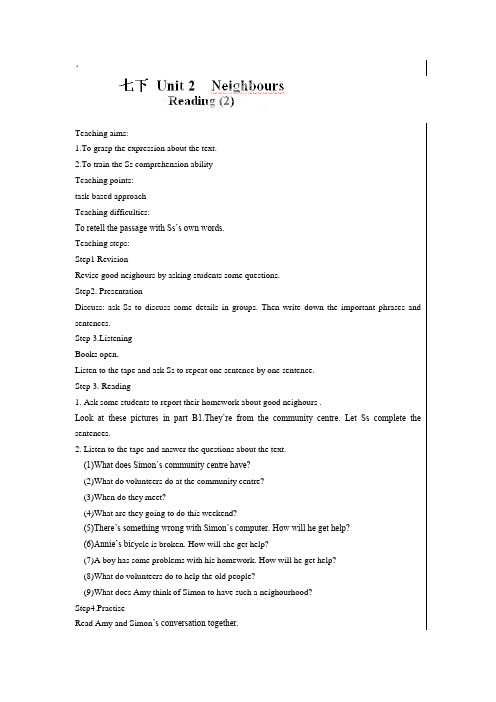
’Teaching aims:1.To grasp the expression about the text.2.To train the Ss comprehension abilityTeaching points:task-based approachTeaching difficulties:To retell the passage with Ss’s own words.Teaching steps:Step1 RevisionRevise good neighours by asking students some questions.Step2. PresentationDiscuss: ask Ss to discuss some details in groups. Then write down the important phrases and sentences.Step 3.ListeningBooks open.Listen to the tape and ask Ss to repeat one sentence by one sentence.Step 3. Reading1. Ask some students to report their homework about good neighours .Look at these pictures in part B1.They’re from the community centre. Let Ss complete the sentences.2. Listen to the tape and answer the questions about the text.(1)What does Simon’s community centre have?(2)What do volunteers do at the community centre?(3)When do they meet?(4)What are they going to do this weekend?(5)There’s something wrong with Simon’s computer. How will he get help?(6)Annie’s bic ycle is broken. How will she get help?(7)A boy has some problems with his homework. How will he get help?(8)What do volunteers do to help the old people?(9)What does Amy think of Simon to have such a neighourhood?Step4.PractiseRead Amy and Simon’s conversation together.Read again, boys play the roles of Simon, girls play the role of Amy.Please complete the part3.Practise this conversation with your partner.Step5.Act it out(choose 1)Do a role-play. Suppose one of you is Simon. The other is Amy. Try to act out the conversation. Who wants to play the role of Simon to introduce the community centre in your nighbourhood? Who wants to play the role of Amy? Please tell us if you want to have a community centre like that. You can choose one role each and discuss this with your partner.Step nguage pointsanyone pron. used instead of someone in negative sentences and in questions.broken adj. has been damaged or injured, no longer whole or woking correctly.check vt. to examine sth to see if it is correct, safe or satisfactory .You should check your homework before handing it in .college n. a university where students can study for a degree after they have left high school. eg.Lily is going to visit some famous colleges in Beijing during this summer holiday. community n. a group of people living in particular local area. In my community, we have a lot of activities at weekends.Engineer n. a person whose job is to design and build engines, machines, roads, bridges, etc.eg.My cousin wants to be an engineer when he grows up.fix vt. to repair or correct sth.eg. The car won’t start---can you fix it?HomeworkRetell the text.2.《课课练》P14。
牛津译林版英语七年级下册Unit 2 Neighbours书面表达(含答案)
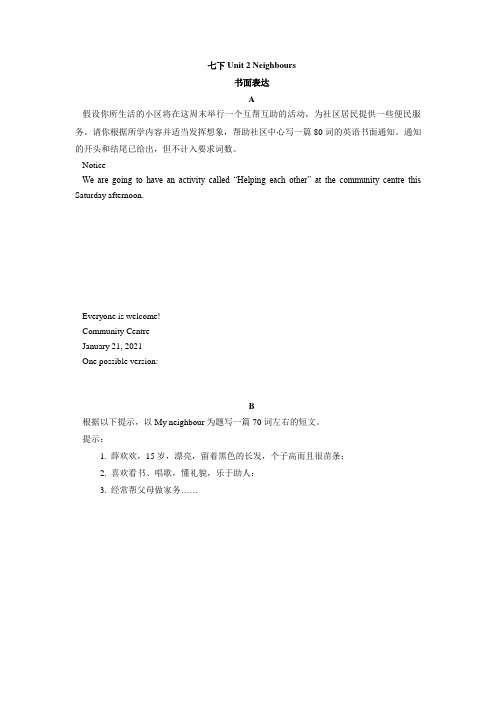
七下Unit 2 Neighbours书面表达A假设你所生活的小区将在这周末举行一个互帮互助的活动,为社区居民提供一些便民服务。
请你根据所学内容并适当发挥想象,帮助社区中心写一篇80词的英语书面通知。
通知的开头和结尾已给出,但不计入要求词数。
NoticeWe are going to have an activity called “Helping each other” at the community centre this Saturday afternoon._____________________________________________________________________________ _______________________________________________________________________________ _______________________________________________________________________________ _______________________________________________________________________________ _______________________________________________________________________________ _______________________________________________________________________________ _____________________________________________________________________________ Everyone is welcome!Community CentreJanuary 21, 2021One possible version:B根据以下提示,以My neighbour为题写一篇70词左右的短文。
牛津译林版英语七年级下册Unit2NeighboursReading2优秀教学案例
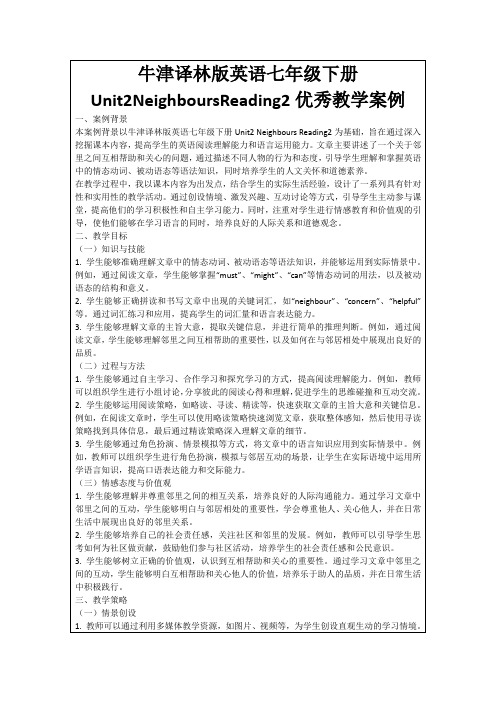
(二)过程与方法
1.学生能够通过自主学习、合作学习和探究学习的方式,提高阅读理解能力。例如,教师可以组织学生进行小组讨论,分享彼此的阅读心得和理解,促进学生的思维碰撞和互动交流。
3.教师可以引导学生进行小组讨论,让学生分享彼此对邻里关系的看法和经历。例如,教师可以让学生分组讨论,讨论邻里之间互相帮助的重要性,以及如何在与邻居相处中展现出良好的品质。
(二)讲授新知
1.教师可以通过讲解文章中的关键词汇和语法知识,帮助学生理解和掌握相关知识点。例如,教师可以讲解情态动词“must”、“might”、“can”的用法,以及被动语态的结构和意义,让学生通过听讲和练习,掌握这些语法知识。
2.学生能够运用阅读策略,如略读、寻读、精读等,快速获取文章的主旨大意和关键信息。例如,在阅读文章时,学生可以使用略读策略快速浏览文章,获取整体感知,然后使用寻读策略找到具体信息,最后通过精读策略深入理解文章的细节。
3.学生能够通过角色扮演、情景模拟等方式,将文章中的语言知识应用到实际情景中。例如,教师可以组织学生进行角色扮演,模拟与邻居互动的场景,让学生在实际语境中运用所学语言知识,提高口语表达能力和交际能力。
2.教师可以利用实物道具、模拟场景等方式,将学生带入到真实的学习情境中。例如,在讲解邻里之间的互动时,教师可以准备一些道具,如邻里之间的日常用品等,让学生通过触摸、观察等方式,更直观地理解和学习相关知识。
3.教师可以通过角色扮演、情景模拟等方式,将学生带入到真实的交流情境中。例如,在讲解邻里之间的互动时,教师可以组织学生进行角色扮演,模拟与邻居互动的场景,让学生在实际语境中运用所学语言知识,提高口语表达能力和交际能力。
牛津译林版七年级下册Unit2《Neighbours》(Reading)说课稿

牛津译林版七年级下册Unit 2《Neighbours》(Reading)说课稿一. 教材分析《Neighbours》是牛津译林版七年级下册Unit 2的一篇阅读文章,主要讲述了一个关于邻居之间的故事。
通过这个故事,学生可以了解到不同国家的邻居之间的相处方式,以及如何尊重和理解他人。
文章内容贴近学生的生活,易于引起学生的共鸣,激发他们的学习兴趣。
二. 学情分析针对七年级的学生,他们已经具备了一定的英语基础,对于日常生活中的交流已经有了基本的掌握。
但是,他们的阅读理解能力还有待提高,特别是在理解长篇文章和复杂句子结构方面。
此外,学生的词汇量和语法知识也亟待丰富和提高。
三. 说教学目标1.知识目标:学生能够掌握文章中的关键词汇和句型,理解文章的主旨大意。
2.能力目标:学生能够提高阅读理解能力,能够运用所学知识进行简单的交流。
3.情感目标:学生能够学会尊重和理解他人,培养良好的邻里关系。
四. 说教学重难点1.重点:学生能够掌握文章中的关键词汇和句型,理解文章的主旨大意。
2.难点:学生能够运用所学知识进行阅读理解,能够灵活运用文章中的词汇和句型。
五. 说教学方法与手段本节课采用任务型教学法,通过设定各种任务,引导学生主动参与学习,提高他们的阅读理解能力和交际能力。
同时,利用多媒体教学手段,如PPT和视频,帮助学生更好地理解和掌握文章内容。
六. 说教学过程1.导入:通过展示一些关于邻居的图片,引导学生谈论邻居之间的关系,激发学生的学习兴趣。
2.阅读理解:学生自主阅读文章,回答相关问题,检测学生的阅读理解能力。
3.词汇学习:学生通过小组合作,找出文章中的关键词汇和句型,并进行讲解和交流。
4.语法讲解:教师针对文章中的复杂句子结构进行讲解,帮助学生理解和掌握。
5.小组讨论:学生分组讨论如何与邻居相处,以及如何尊重和理解他人。
6.情景模拟:学生分组进行情景模拟,运用所学知识进行实际操作。
7.总结:教师对学生的学习情况进行总结,强调尊重和理解他人的重要性。
牛津译林版七年级下册Unit 2《Neighbours》(Study skills)教学设计

牛津译林版七年级下册Unit 2《Neighbours》(Study skills)教学设计一. 教材分析牛津译林版七年级下册Unit 2《Neighbours》主要讲述了关于邻居的话题。
通过本节课的学习,学生能够掌握与邻居相关的词汇和表达方式,学会如何用英语询问和描述邻居的信息。
教材中包含了丰富的插图、对话和练习,有助于激发学生的学习兴趣,提高他们的语言运用能力。
二. 学情分析七年级的学生已经具备了一定的英语基础,能够听懂并运用简单的英语进行交流。
但他们在口语表达和词汇积累方面仍有待提高。
此外,学生对身边的事物和人物较为熟悉,因此对邻居这一主题应能产生共鸣,有利于激发学习兴趣。
三. 教学目标1.知识目标:学生能够掌握与邻居相关的词汇和表达方式,如:neighbor, opposite, across from等。
2.能力目标:学生能够用英语询问和描述邻居的信息,提高他们的语言运用能力。
3.情感目标:学生能够学会与邻居友好相处,培养良好的邻里关系。
四. 教学重难点1.重点:掌握与邻居相关的词汇和表达方式。
2.难点:如何用英语询问和描述邻居的信息。
五. 教学方法1.情境教学法:通过设置真实的生活情境,让学生在实际语境中学习英语。
2.交际法:鼓励学生进行互动交流,提高他们的口语表达能力。
3.任务型教学法:通过完成具体任务,培养学生运用英语解决问题的能力。
六. 教学准备1.教师准备:教材、教案、多媒体教学资源。
2.学生准备:课本、笔记本、文具。
七. 教学过程1.导入(5分钟)教师通过提问方式引导学生谈论身边的人和事,如:“Do you know your neighbors? What kind o f people are they?”,激发学生的学习兴趣。
2.呈现(10分钟)教师展示教材中的插图,引导学生观察并说出邻居的名称。
然后,教师通过PPT呈现邻居的词汇和表达方式,如:neighbor, opposite, across from等,让学生跟读并模仿。
牛津译林版英语七下7B Unit2 Neighbours Reading II
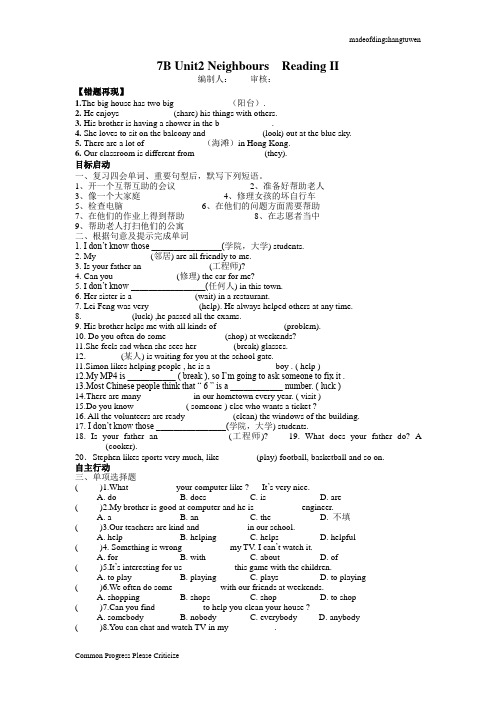
7B Unit2 Neighbours Reading II编制人:审核:【错题再现】1.The big house has two big ____________(阳台).2. He enjoys ____________(share) his things with others.3. His brother is having a shower in the b____________.4. She loves to sit on the balcony and ____________ (look) out at the blue sky.5. There are a lot of _____________(海滩)in Hong Kong.6. Our classroom is different from _______________ (they).目标启动一、复习四会单词、重要句型后,默写下列短语。
1、开一个互帮互助的会议_________________2、准备好帮助老人______________________3、像一个大家庭___________________4、修理女孩的坏自行车_______________________5、检查电脑__________________6、在他们的问题方面需要帮助_______________________7、在他们的作业上得到帮助________________8、在志愿者当中_______________________9、帮助老人打扫他们的公寓_______________________二、根据句意及提示完成单词1. I don’t know those ________________(学院,大学) students.2. My ____________(邻居) are all friendly to me.3. Is your father an _______________(工程师)?4. Can you ______________(修理) the car for me?5. I don’t know _________________(任何人) in this town.6. Her sister is a ______________(wait) in a restaurant.7. Lei Feng was very ___________(help). He always helped others at any time.8. ___________(luck) ,he passed all the exams.9. His brother helps me with all kinds of _______________(problem).10. Do you often do some _____________(shop) at weekends?11.She feels sad when she sees her ________(break) glasses.12.________(某人) is waiting for you at the school gate.11.Simon likes helping people , he is a ______________ boy . ( help )12.My MP4 is ___________ ( break ), so I’m going to ask someone to fix it .13.Most Chinese people think that “ 6 ” is a ____________ number. ( luck )14.There are many ___________ in our hometown every year. ( visit )15.Do you know ___________ ( someone ) else who wants a ticket ?16. All the volunteers are ready __________ (clean) the windows of the building.17. I don’t know those ________________(学院,大学) students.18. Is your father an _______________(工程师)? 19. What does your father do? A _______(cooker).20.Stephen likes sports very much, like ________(play) football, basketball and so on.自主行动三、单项选择题( )1.What __________ your computer like ? It’s very nice.A. doB. doesC. isD. are( )2.My brother is good at computer and he is __________ engineer.A. aB. anC. theD. 不填( )3.Our teachers are kind and __________ in our school.A. helpB. helpingC. helpsD. helpful( )4. Something is wrong __________ my TV. I can’t watch it.A. forB. withC. aboutD. of( )5.It’s interesting for us ___________ this game with the children.A. to playB. playingC. playsD. to playing( )6.We often do some __________ with our friends at weekends.A. shoppingB. shopsC. shopD. to shop( )7.Can you find __________ to help you clean your house ?A. somebodyB. nobodyC. everybodyD. anybody( )8.You can chat and watch TV in my __________.A. kitchenB. bathroomC. bedroomD. living room( )9. There are _________ animals in the zoos.A. a kind ofB. many kind ofC. many kinds ofD. many kinds( )10. There must be_________ wrong with the clock . It doesn’t work .A. nothingB. somethingC. everythingD. anything( )11.We’re____________ a big ____________ .A.like; homeB. like; houseC. liking; familyD. like; family( )12.--- Is there a desk in your room ? --- _________ . And my computer is on it .A. Yes , it isB. Yes , there isC. No, it isn’tD. No, there isn’t( )13.--- ________ you ________ help others ? ---- Yes , I am .A. Do; ready toB. Are; ready toC. Do; ready forD. Are ; ready for( )14.There _________ a lion show in the zoo tomorrow afternoon.A. wasB. is going to haveC. will haveD. is going to be( )15. He doesn’t have _______________A. own study B. he own study C his own study D own his study( )16. Some social workers are ready to help us _____ all kinds of problems in our community centre.A. doingB. withC. forD. in( )17.Can you find ______to help you with your homework?A. someoneB. anyoneC. everyoneD. some one( )18. There is ______ with my computer. It doesn’t work.A. wrong somethingB. nothing wrongC. anything wrongD. something wrong ( )19. The volunteers help us with all kinds of _______.A. questionsB. problemsC. troublesD. skill( )20. My uncle is _____engineer. He works very hard. A. the B. a C. an D. / 合作互动四、句型转换1. There is something wrong with my computer.(同义句)_________ __________________ with my computer.2. They are going to have a meeting this weekend.(一般疑问句)______ ________ ________ _______ have a meeting this weekend?3. People go to the community centre when they need help with their problems.(划线提问)_______ _______ _____ when they need help with their problems?4. Annie’s computer is broken.(划线提问)______ _______ _______ Annie’s computer?5. His father is going to help me with my my maths. (同义句)His father will _______ _________ ________m maths.五.翻译句子1、这周他们打算开一个会吗?_____________________________________________________________________________ 2、我姐姐的自行车坏了。
牛津译林版七年级下册Unit 2《Neighbours》(Reading)教学设计

牛津译林版七年级下册Unit 2《Neighbours》(Reading)教学设计一. 教材分析《Neighbours》是人教版牛津译林英语七年级下册的一篇文章,主要讲述了澳大利亚和英国邻居的不同生活方式。
文章通过描述两家邻居的日常生活,让学生了解并比较不同国家的文化差异。
文章语言简单,贴近学生生活,易于激发学生的学习兴趣。
二. 学情分析七年级的学生已经具备了一定的英语基础,能够进行简单的英语交流。
但他们在阅读理解、词汇积累和语言运用方面还存在一定的困难。
因此,在教学过程中,需要关注学生的个体差异,尽量采用简单明了的教学方法,帮助学生理解和掌握文章内容。
三. 教学目标1.知识目标:让学生掌握文章中的关键词汇和短语,如“neighbours”,“roof”,“front garden”等。
2.能力目标:培养学生具备一定的阅读理解能力,能够借助图片和上下文理解文章内容。
3.情感目标:让学生通过学习,认识到不同国家的文化差异,培养他们的跨文化交际意识。
四. 教学重难点1.重点:让学生掌握文章中的关键词汇和短语,理解文章内容。
2.难点:帮助学生运用所学词汇和短语进行实际交流,提高他们的语言运用能力。
五. 教学方法1.任务型教学法:通过设定各种任务,让学生在完成任务的过程中,自然地学习和掌握文章内容。
2.情境教学法:创设真实的生活情境,让学生在实际语境中学习和运用英语。
3.小组合作学习:鼓励学生进行小组讨论和合作,提高他们的团队协作能力和沟通能力。
六. 教学准备1.准备相关图片和视频,以便在课堂上展示和引导学生进行讨论。
2.准备课文翻译和练习题,以便在课堂上进行操练和巩固。
3.准备PPT,以便在课堂上展示课文内容和相关知识点。
七. 教学过程1.导入(5分钟)利用图片和视频展示澳大利亚和英国的风景,引导学生谈论自己喜欢的国家和文化。
通过这种方式,激发学生的学习兴趣,为课堂活动做好铺垫。
2.呈现(10分钟)利用PPT展示文章标题和图片,让学生根据图片预测文章内容。
牛津译林七年级英语下册Unit 2 Neighbours Reading1,2课件
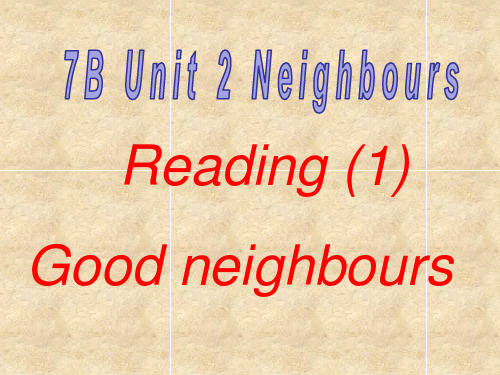
B3
My neighbours
My neighbours are kind and helpful. Some of them are volunteers. They have d__if_fe_r_e_n_t_s_k_i_ll_s and
college students大学生
[`kɔlid3]
They help the children with their homework.
They cut hair for the old people.
Mr Wang Mr Wang
an engineer (工程师)
[,endʒə'nɪr]
all kinds of
at the weekend broken check
different skills fix
homework lucky
problems
ready to help
Students can get help with their homework.There are some college students among the volunteers,and they are alwaysready to help.Volunteers also help the old people.
5.Annie’s bicycle is broke. How will she get help?
She’ll ask someone to fix it.
6.A student has some problems with his homework. How will he get help?
2017牛津译林版七年级下册Unit2NeighboursGrammar2
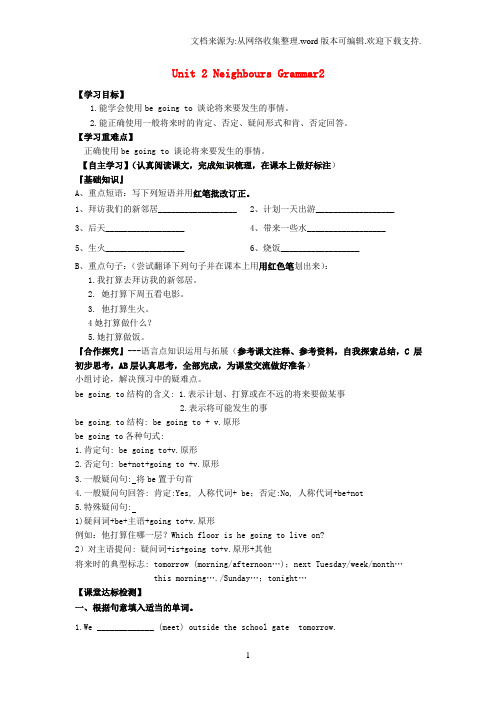
Unit 2 Neighbours Grammar2【学习目标】1.能学会使用be going to 谈论将来要发生的事情。
2.能正确使用一般将来时的肯定、否定、疑问形式和肯、否定回答。
【学习重难点】正确使用be going to 谈论将来要发生的事情。
【自主学习】(认真阅读课文,完成知识梳理,在课本上做好标注)『基础知识』A、重点短语:写下列短语并用红笔批改订正。
1、拜访我们的新邻居__________________2、计划一天出游__________________3、后天__________________4、带来一些水__________________5、生火__________________6、烧饭__________________B、重点句子:(尝试翻译下列句子并在课本上用用红色笔划出来):1.我打算去拜访我的新邻居。
2. 她打算下周五看电影。
3. 他打算生火。
4她打算做什么?5.她打算做饭。
『合作探究』---语言点知识运用与拓展(参考课文注释、参考资料,自我探索总结,C层初步思考,AB层认真思考,全部完成,为课堂交流做好准备)小组讨论,解决预习中的疑难点。
be going to结构的含义:1.表示计划、打算或在不远的将来要做某事2.表示将可能发生的事be going to结构: be going to + v.原形be going to各种句式:1.肯定句: be going to+v.原形2.否定句: be+not+going to +v.原形3.一般疑问句: 将be置于句首4.一般疑问句回答: 肯定:Yes, 人称代词+ be;否定:No, 人称代词+be+not5.特殊疑问句:1)疑问词+be+主语+going to+v.原形例如:他打算住哪一层?Which floor is he going to live on?2)对主语提问: 疑问词+is+going to+v.原形+其他将来时的典型标志: tomorrow (morning/afternoon…);next Tuesday/week/month…this morning…./Sunday…;tonight…【课堂达标检测】一、根据句意填入适当的单词。
牛津译林版七年级下册英语课件:Unit 2 Neighbours reading II
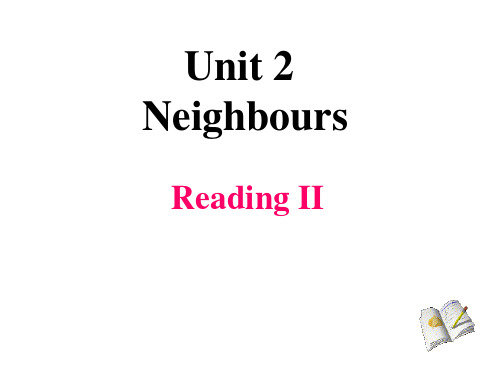
He is always ready to help others.
ready 还意为“准备好的” 为……做准备 准备好去做某事
be ready to do sth. get ready to do sth.
原句:Some of them often visit the old people and do some shopping for them. do some shopping意思是“买东西,购 物”。do some/the + V-ing短语结构常 用来泛指做某类事情。 打扫卫生
ask an engineer 5. 叫一个工程师来检查一下 to check it 7. 帮助你的作业 help you with your homework
8. 乐于帮助人
of problems
be ready to help
9. 大学生
college students
do some shopping / reading 11. 修理那个女孩的自行车 fix the girl’s bicycle
1. help sb. with sth. 在某一方面帮助某人
v.
那位大学生正在帮助那个男孩做家庭作业。
The college student is helping the boy with his homework. 他经常帮助我学英语。
He often helps me with my English.
谢谢你的帮助。
Thank you for your help.
1. help sb. with sth. 在某一方面帮助某人
v.
2. help sb. do sth. 帮助某人做某事
牛津译林版英语七下Unit 2《Neighbours》(Reading II)ppt课件

e.g. I sometimes help my mother clean the room.
(2) help sb. with sth. 帮助某人解决某种困难 e.g. Simon always helps us with English.
(3) kinds of ... 各种各样的…… e.g. There are different kinds of books on the shelves.
C. What is
D. How does
2. Mr. Lee is a good teacher. He
always helps us ______ English.
A. in
B. with
C. at
D. for
3. — Is ________ anything wrong _____ your mobile phone?
This weekend, they will help the old people clean their (16) _f_l_a_ts_. Amy: That’s great! You’re (17) __lu_c_k_y_ to live in a neighbourhood like that, Simon.
Computer engineers are popular. They help people ______c_htehcekir computers. You can also find someone to _____ thinfgixs like _______ bbircoykcleens.
5. The voulnteers are always ready _t_o__d_o_ (do) something for people in need.
牛津译林版七年级下册Unit 2《Neighbours》(reading)-课件

Read and complete
People
Problems How do volunteers help them?
Simon
Annie
Students
The old people
Computer
check the computer
Bicycle is broken
homework
fix the broken bicycle help them with homework
试卷下载:/shiti/
教案下载:/jiaoan/
PPT论坛:
PPT课件:/kejian/
语文课件:/kejian/yuw en/ 数学课件:-/kejian/shuxue/
英语课件:/kejian/ying yu/ 美术课件:/kejian/me ishu/
s_____, he likes playingtufdoeonttball in the
f____ ____ near my homoeo.tball field
Listen and answer
• 1. What do volunteers do?
They help people with all kinds of problems.
all kinds of problems at the weekend broken check different skills fix homework lucky ready to help
1. My neighbours are kind and helpful . Some of them
---
teacher
waiter
• My name is Lucy. I am a w____a_iteanrd I work in a r___e_s_ta_u. rI alinvte in a f____la_tnear the center of the city. There are s_u_p_e_rm__arke,ths ___o_s_p_it_aalsnd s____chinoomlsy n____e_ig_h_b.oArhnnie is my neighbor, she is a t____o_o_d, sheeahchaesra son called Alex, he is a
牛津译林版七年级下册Unit 2《Neighbours》(Reading II)教学设计

牛津译林版七年级下册Unit 2《Neighbours》(Reading II)教学设计一. 教材分析牛津译林版七年级下册Unit 2《Neighbours》(Reading II)讲述了澳大利亚和英国邻居在生活方式上的异同。
通过讲述两家邻居的日常生活,让学生了解并对比不同国家的文化,培养学生的跨文化交际意识。
文章以记叙文形式展开,语言简洁明了,贴近生活。
本节课的主要内容是让学生掌握文章的主旨大意,能运用所学知识进行日常交流。
二. 学情分析七年级的学生已经掌握了一些基本的英语语法和词汇,具备一定的听说读写能力。
但他们在阅读理解方面还存在一定的困难,特别是对于长篇阅读材料的理解和分析。
此外,学生对澳大利亚和英国的文化差异了解不多,需要通过本节课的学习来拓展视野。
三. 教学目标1.知识目标:–能理解文章的主旨大意,掌握文章的基本事实。
–学会使用日常英语描述生活中的事物和行为。
–了解澳大利亚和英国在生活方式上的异同。
2.能力目标:–提高学生的阅读理解能力,能快速捕捉文章中的关键信息。
–培养学生的跨文化交际意识,能用英语进行简单的交流。
3.情感目标:–激发学生学习英语的兴趣,培养积极的学习态度。
–引导学生尊重和理解不同国家的文化差异。
四. 教学重难点•掌握文章的主旨大意,理解文章的基本事实。
•运用所学知识进行日常英语交流。
•理解文章中关于澳大利亚和英国文化差异的描述。
•提高学生的阅读理解能力,能快速捕捉文章中的关键信息。
五. 教学方法1.任务型教学法:通过设定各种任务,让学生在实践中学习和运用英语。
2.交际型教学法:鼓励学生积极参与课堂交流,提高口语表达能力。
3.情境教学法:创设生活情境,让学生在真实的环境中学习英语。
六. 教学准备1.教材:牛津译林版七年级下册Unit 2《Neighbours》(Reading II)。
2.多媒体设备:电脑、投影仪、音响等。
3.教学辅助材料:图片、卡片、PPT等。
七. 教学过程1.导入(5分钟)教师通过提问方式引导学生谈论邻居和自己生活中的日常事物,激发学生的学习兴趣。
牛津译林版七下Unit 2 Neighbours period 2 Reading教案
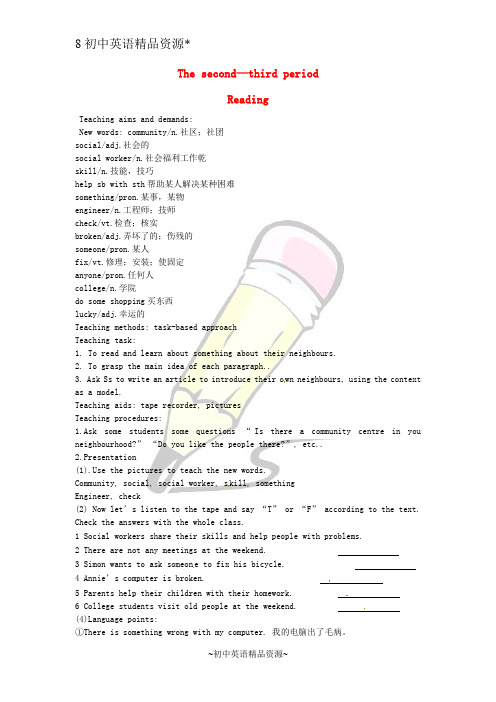
The second—third periodReadingTeaching aims and demands:New words: community/n.社区;社团social/adj.社会的social worker/n.社会福利工作乾skill/n.技能,技巧help sb with sth帮助某人解决某种困难something/pron.某事,某物engineer/n.工程师;技师check/vt.检查;核实broken/adj.弄坏了的;伤残的someone/pron.某人fix/vt.修理;安装;使固定anyone/pron.任何人college/n.学院do some shopping买东西lucky/adj.幸运的Teaching methods: task-based approachTeaching task:1. To read and learn about something about their neighbours.2. To grasp the main idea of each paragraph..3. Ask Ss to write an article to introduce their o wn neighbours, using the context as a model.Teaching aids: tape recorder, picturesTeaching procedures:1.Ask some students some questions “Is there a community centre in you neighbourhood?”“Do you like the people there?”, etc..2.Presentation(1).Use the pictures to teach the new words.Community, social, social worker, s kill, somethingEngineer, check(2) Now let’s listen to the tape and say “T” or “F” according to the text. Check the answers with the whole class.1 Social workers share their skills and help people with problems.2 There are not any meetings at the weekend.3 Simon wants to ask someon e to fix his bicycle.4 Annie’s computer is broken.5 Parents help their children with their homework.6 College students visit old people at the weekend.(4)Language points:①There is something wrong with my computer.我的电脑出了毛病。
牛津译林版七年级英语下册Unit2 reading2课件
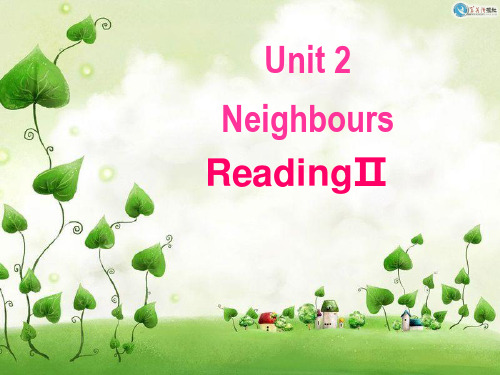
Some of them often visit the old people and do some shopping for them。
14 他打算明天打扫卫生吗? Is he going to do any cleaning
tomorrow?
15你很幸运住在那样的社区里。 You are lucky to live in a neighborhood like that.
是单数形式 _a_n_y_o_n_e____某人,有人;用在否定句和疑
问句中;是单数形式 _n_o__o_n_e____没人,没有一个(表否定) ;是
单数形式 如:房里有人。
There _i_s_______so_m__e_o_n_e_____ in the
room. 教室里有人吗?
___Is______ there a_n_y_o_n__e____ in the classroom? 没人。__N__o____ one
他很幸运成为一名工程师。
________
2.something anything nothing
something 某事,不定代词,用在肯定句中; 后谓语动词用单数,
我的手表出问题了。
_T_h_e_re_’_s _s_o_m_e__th_i_n_g_w_ r_o_n_g__w_i_th____ my watch.
anything某事,不定代词,用在否定句和疑问句中; 后谓语动词用单数,
20.学生能在家庭作业上得到帮助。
Students can get help with their homework.
21.这里的人像一个大家庭。
People here are like a big family.
- 1、下载文档前请自行甄别文档内容的完整性,平台不提供额外的编辑、内容补充、找答案等附加服务。
- 2、"仅部分预览"的文档,不可在线预览部分如存在完整性等问题,可反馈申请退款(可完整预览的文档不适用该条件!)。
- 3、如文档侵犯您的权益,请联系客服反馈,我们会尽快为您处理(人工客服工作时间:9:00-18:30)。
Unit 2 Neighbours Reading II
【学习目标】
1.能用英语介绍社区中心的活动内容。
2. 能建立邻里间互帮互助的理念。
【学习重难点】
1.熟练掌握本课重点句型
There’s something wrong with my computer.
I’m going to ask a computer engineer to check it.
Some college students are ready to help.
They help us with all kinds of problems.
2.能用英语介绍社区中心的活动内容
【自主学习】
一、听磁带,跟读课文。
二、写下列短语并用红笔批改订正。
1、开一个互帮互助的会议__________________
2、准备好帮助老人_____________________
3、像一个大家庭____________
4、修理女孩的坏自行车_______________________
5、检查电脑___________________
6、在他们的问题方面需要帮助_____________________
7、在他们的作业上得到帮助_________________
8、在志愿者当中______________________
9、帮助老人打扫他们的公寓_______________________
【合作探究】(参考课文注释、参考资料,自我探索总结,C层初步思考,AB层认真思考,全部完成,为课堂交流做好准备)
1.What are your neighbours like? 你邻居怎么样?
be like… “像……” , like此处是介词
例1:我们就像是一个大家庭。
We a big family.
例2:像他爸爸,他也喜欢足球。
his father, he also likes football。
2. They help us with all kinds of problems.
他们帮助我们解决各种困难。
help sb with sth 帮助某人某事
例:大学生们经常帮助我们做家庭作业。
The college students often our homework.
help sb (to) do sth帮助某人做某事
例:他经常帮我检查电脑。
He often my computer。
is something wrong with my computer. 我的电脑坏了。
There is something wrong with…
Something is wrong with… 某物有问题
我的手表坏了。
There is something wrong with my watch.
Something is wrong with my watch.
4. Annie’s bicycle is broken.安妮的自行车坏了。
be broken 坏了
我的电脑坏了。
My computer is broken.
5. Some college students are ready to help.
一些大学生时刻准备帮助别人。
be ready to do /be ready for sth. 准备好做某事
例如:我们准备好去散步了。
We are re ady to go for a walk.
【课堂达标检测】
一、根据句意及提示完成单词
1. I don’t know those ________________(学院,大学) students.
2. My ___________(邻居) are al l friendly to me.
3. Is your father an _______________(工程师)?
4. Can you ______________(修理) the car for me?
5. I don’t know _________________(任何人) in this town.
6. Her sister is a ______________(wait) in a restaurant.
7. Lei Feng was very ___________(help). He always helped others at any time.
8. He is _____________(luck) to pass all the exams.
9. His brother helps m e with all kinds of _______________(problem).
10. Do you of ten do some _____________(shop) at weekends?
feels sad when she sees her ________(break) glasses.
(某人) is waiting for you at the school gate.
二、句型转换
1. Th ere is something wrong with my computer.(同义句)
_________ _________ _________ with my computer.
2. They are going to have a meeting this weekend.(一般疑问句)
______ ________ ________ _______ have a meeting this weekend?
3. My cousin is a good engineer.(划线提问)
_______ _______ your cousin?
4. People go to the community centre when they need help with their problems.(划线提问)
_______ _______ _____ when they need help with their problems?
5. Annie’s computer is broken.(划线提问)
______ _______ _______ Annie’s computer?
6. His father is going to help me with my my maths. (同义句)
His father will _______ _________ ________my maths.
三阅读下面的材料,根据其内容,完成后面的表格。
(每格一个单词)
Mr Green is our foreign (外国)teacher . He is a good teacher . He often helps us a lot . And he is nice to every student . His lessons are very interesting . We usually have fun in his lessons . We all like him .
He is a tall and strong man . He says he is 40 years old . But he looks very young . He comes from New York . Now he lives in Nanjing with his family . He has a daughter . She is a pretty girl . And she studies in our school , too .
Mr Green is very “in”. He can sing many English songs . We all like to listen to him singing . He also lik es sports . He is in the school basketball team . Mr Green likes reading . We often borrow books from him .
I think we are lucky(幸运)to have Mr Green to teach us .
Name Mr Green
Job A 1
Nationality(国籍) 2
3 40
What he is like Mr Green is tall and 4 . He looks 5 . His
6
are interesting and he likes to 7 his
students a lot.
8 Music, sports and reading .
Family He has a pretty 9 . She 10 in our
school .。
